
As Britain's champion of eating good, healthy meals brings his restaurants to Asia, his cookbooks are taking center stage in many Chinese bookstores. Xing Yi and Mike Peters turn the pages with translator Cecilia Pym.
Celebrity chef Jamie Oliver announced plans to expand his Italian restaurant brand around the world back in 2013, with Hong Kong, Beijing and other Asian cities in his game plan. The Hong Kong edition of Jamie's Italian opened last year, and the buzz now is that Britain's longtime champion of the "delicious and nutritious" could open in China's capital soon.
A Beijing outlet might be particularly satisfying to Oliver, whose penchant for bringing global cuisines into everyone's home kitchen is reflected in more than a dozen popular cookbooks. In Jamie's Dinners, he wrote: "Peking duck is something that has always been very close to the Oliver family. Bizarrely enough, the fact that my parents ran a pub restaurant meant that we very rarely went out for dinner as a family, but when we did, my old man used to take us out to this Chinese restaurant in Sawbridgeworth where we all fell in love with Peking duck. There are hundreds of ways of cooking duck in Asian cultures - steamed, roasted, pumped up with bicycle pumps to remove the meat from the skin - but we're at home and so we can't do with all this mucking about. My way is simple and it works ..."
|
Bookstores in China are packed with recent Chinese editions of chef Jamie Oliver's cookbooks. Oliver plans to expand his Italian restaurant brand in China. Feng Yongbin / China Daily |
While Beijingers wait to see if 2015 is indeed the Year of Jamie, the chef has made a presence for himself in advance. In cities around the country, bookstores are packed with recent Chinese editions of his cookbooks. China Daily chats with Cecilia Pym, who took on the job of translating some of what have become Western culinary classics.
Q & A
Have you translated cookbooks before?
No, But I've been using cookbooks in English for years. As a previous editor of one of Shanghai's English lifestyle magazines, I have written a lot of restaurant reviews, about food from all over the world, so I have a clear concept about food. After we moved to Dali about 10 years ago, I had time and interest to cook for my family on a daily basis, and having read all kinds of recipes, I understand not only the whole process of cooking, but also ingredients and utensils for Western cooking. I guess that helped a lot for the job.
What are the special challenges of translating cookbooks?
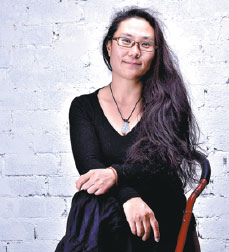
Western and Chinese cooking are very different - ie, Chinese cooking involves just one big cleaver and a wok, while Western cooking has a lot of fun kitchen toys and uses the oven. So there are some techniques that are not familiar to Chinese readers. Some require very precise measurements such as teaspoons, tablespoons - ml to grams - while Chinese cookbooks always say: a bit of this, a bit of that. Newbies would probably be put off reading Western cookbooks, but once they tried to make something, and if the result was good enough, I'm sure that they'd have more confidence next time.
Did you work with Jamie Oliver directly at all during these projects?
I haven't worked with Jamie Oliver directly in any way. I've known about him for more than a decade, and used quite a few of his cookbooks before, watched his cooking programs and bought his video about his Italian trip, etc. So he's not a stranger to me at all, and translating the cookbooks is quite straightforward, not that I don't want to meet him in person. I always hoped to cook with him if he ever visited China, or when I go to the UK.
Some of these books are about recipes that are "quick" and "easy". Is that a new idea for traditional Chinese cooks?
My personal experience is, I need to make everything from scratch: I make pancakes by weighing the flour and beating the eggs, I make tortillia wraps from mixing the dough. But, on the other hand, for people living in Beijing, Shanghai and Guangzhou, there are Tescos and Wal-mart, etc, so it's a lot easier for them to get (prepackaged) ingredients. I tried some of the recipes, and always tried to get my substitutes, but I did not make any adjustments for Chinese readers in the book.
Did you ever test your translations by asking Chinese readers to use them?
I have tried loads of the recipes, although sometimes (for myself) I alter the recipe a little, but most of the time, it's because of the personal taste that requires a bit less sugar or more chili, etc. I have a group of moms living in Dali in my community, and many of them have bought Jamie's cookbooks that I translated, and we sometime gather to cook a recipe together.
Why do you think such cookbooks appeal to Chinese readers?
As Chinese people are more and more interested in a healthy lifestyle and also interested in trying new things, Western food has become appealing. Many had tried baking simple cookies and cakes to start with; some found it so different and interesting from their daily staple, they want to try more. Jamie Oliver is famous not only in the UK, but also globally. As more Chinese people have received higher education now, English has become an essential tool for most of the younger generation, and exploring the Western cooking is a good way to learn about Western culture and history.
Contact the writers through michaelpeters@chinadaily.com.cn
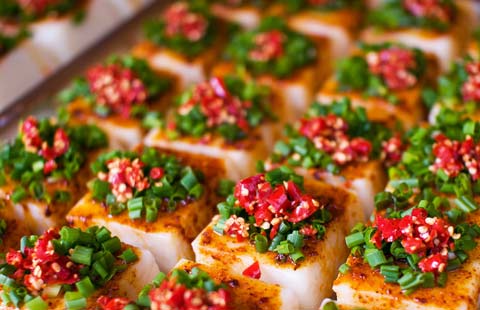
China's top 10 foodie cities |
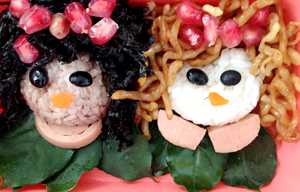
Cute boxed meals |
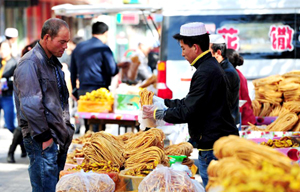
Muslims greet annual festival of Eid al-Adha in Yinchuan |
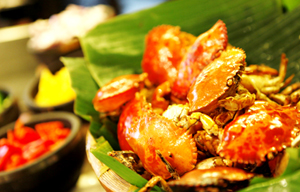
Cafe Noir hosts Singapore food festival |
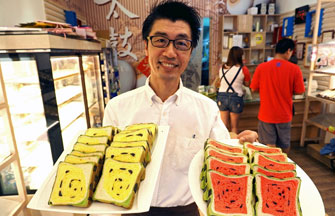
Watermelon toast gains popularity in Taiwan |
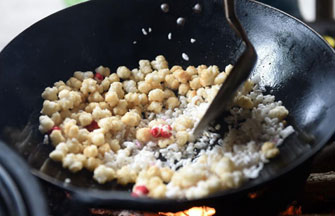
Tradition of drinking oleic tea in Guangxi |
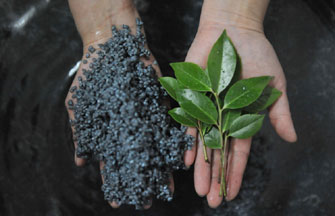
Black rice treats in summertime |

Fashionable cakes in Hong Kong |